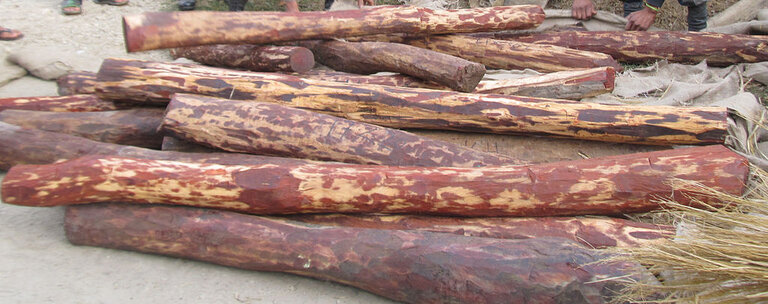The Hong Kong Customs and Excise Department discovered more than 10 tons of endangered, protected red sandalwood hidden in a shipping container with an estimated value of USD$774 000. The container was on its way from the Middle East to mainland China via Hong Kong.
—
The haul of suspected red sandalwood is the biggest seizure of its kind this year, according to the customs department, and the third major seizure of the wood in the last 6 months. The case has been given to the Agriculture, Fisheries and Conservation Department for a follow-up investigation but no arrests have been made so far.
Red sandalwood, also known as “red gold,” is extremely valuable and is often used to make luxury furniture and carvings. It is listed as endangered under the Convention on International Trade in Endangered Species of Wild Fauna and Flora (CITES) list. In Hong Kong, importing or exporting endangered wood without a permit carries a maximum sentence of 10 years in jail and a HKD$10 million fine.
You might also like: 11 Things That Happened at the UN Summit on Biodiversity
In August, more than 3 tons of red sandalwood valued at HKD$1.8 million was found hidden in a container on its way from South Korea to China via Hong Kong. In April, nearly 8 tons of the wood worth around HKD$5.5 million were found concealed inside furniture in two shipping containers from India, also bound for China.
A 2018 report called “Trading in Extinction,” compiled by various NGOs and groups, including the Hong Kong Wildlife Trade Working Group, Civic Exchange, Hong Kong Shark Foundation, University of Hong Kong and WWF-Hong Kong, found that between 2013 and 2017, there were 40 seizures comprising 239 Megatons of red sandalwood. It also found that sandalwoods were the most regularly traded wood species throughout this period.
While the customs department should be applauded for making the find, more stringent checks need to be made at the country of origin to ensure that these groups working illegally to smuggle protected plants and animals cannot do their work and the demand for these products ends.
Featured image by: Wikimedia Commons

















